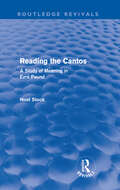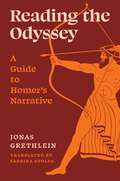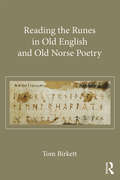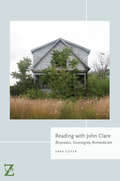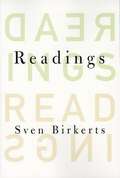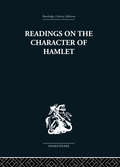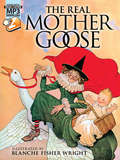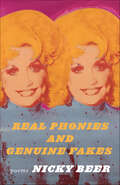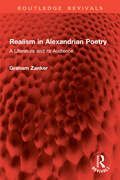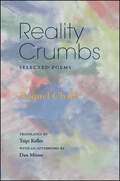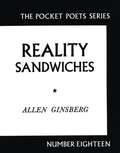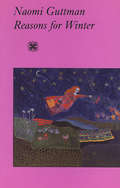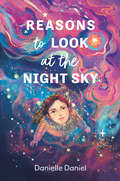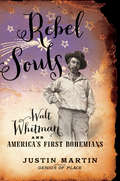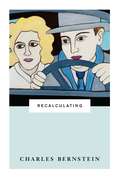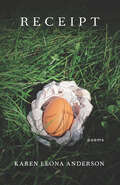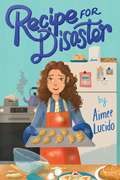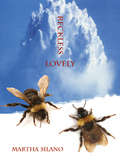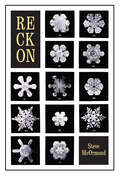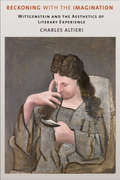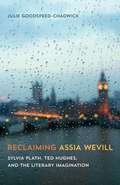- Table View
- List View
Reading the Cantos: A Study of Meaning in Ezra Pound (Routledge Revivals)
by Noel StockFirst published in 1967, this is a study which tackles the central problem of meaning, within Ezra Pound's The Cantos. It deals with the question of important critical issues, as well as of interpretation and understanding. Students of modern poetry will derive great benefit from this vigorous and lucid analysis of Pound's masterpiece. Noel Stock's finding is radical: that The Cantos is not a really a poem at all, but rather notes towards a poem. It is a collection of fragments of varying quality - some of extraordinary power and beauty - but in no sense formed into a work of art.
Reading the Odyssey: A Guide to Homer’s Narrative
by Jonas GrethleinA fresh and original introduction to the Odyssey—and how it continues to shape literature, film, art and even the ways we make sense of our livesReading the Odyssey is an introduction to Homer&’s masterpiece like no other. It combines a cultural and intellectual history of the epic with an in-depth exploration of its unique and influential narrative structure and the ways it continues to inform issues of identity, meaning and experience.Reading the Odyssey begins with a broad history of the epic&’s reception and interpretation, its place in cultural and intellectual history and its influence today on literature, film and art. After introducing the literary form of the Odyssey, the book turns to its main focus: the layered narrative that lies at the heart of the poem. Taking readers on a tour of the epic, Jonas Grethlein shows the nuanced ways the Odyssey uses a wide variety of narrative forms and functions. At the same time, he highlights how we all rely on narratives, first used by Homer, to form identities, forge communities and make sense of our lives.The result is a compelling guide to the Odyssey that demonstrates why it continues to speak so powerfully to so many readers today.
Reading the Runes in Old English and Old Norse Poetry
by Thomas BirkettReading the Runes in Old English and Old Norse Poetry is the first book-length study to compare responses to runic heritage in the literature of Anglo-Saxon England and medieval Iceland. The Anglo-Saxon runic script had already become the preserve of antiquarians at the time the majority of Old English poetry was written down, and the Icelanders recording the mythology associated with the script were at some remove from the centres of runic practice in medieval Scandinavia. Both literary cultures thus inherited knowledge of the runic system and the traditions associated with it, but viewed this literate past from the vantage point of a developed manuscript culture. <P><P> There has, as yet, been no comprehensive study of poetic responses to this scriptural heritage, which include episodes in such canonical texts as Beowulf, the Old English riddles and the poems of the Poetic Edda. By analysing the inflection of the script through shared literary traditions, this study enhances our understanding of the burgeoning of literary self-awareness in early medieval vernacular poetry and the construction of cultural memory, and furthers our understanding of the relationship between Anglo-Saxon and Norse textual cultures. The introduction sets out in detail the rationale for examining runes in poetry as a literary motif and surveys the relevant critical debates. The body of the volume is comprised of five linked case studies of runes in poetry, viewing these representations through the paradigm of scriptural reconstruction and the validation of contemporary literary, historical and religious sensibilities.
Reading the Victory Ode
by Chris Carey Peter Agócs Chris Carey Richard Rawles Peter AgócsThe victory ode was a short-lived poetic genre in the fifth century BC, but its impact has been substantial. Pindar, Bacchylides and others are now among the most widely read Greek authors precisely because of their significance for the literary development of poetry between Homer and tragedy and their historical involvement in promoting Greek rulers. Their influence was so great that it ultimately helped to define the European notion of lyric from the Renaissance onwards. This collection of essays by international experts examines the victory ode from a range of angles: its genesis and evolution, the nature of the commissioning process, the patrons, context of performance and re-performance, and the poetics of the victory ode and its exponents. From these different perspectives the contributors offer both a panoramic view of the genre and an insight into the modern research positions on this complex and fascinating subject.
Reading with John Clare: Biopoetics, Sovereignty, Romanticism (Lit Z)
by Sara GuyerReading with John Clare argues that at the heart of contemporary biopolitical thinking is an insistent repression of poetry. By returning to the moment at which biopolitics is said to emerge simultaneously with romanticism, this project renews our understanding of the operations of contemporary politics and its relation to aesthetics across two centuries.Guyer focuses on a single, exemplary case: the poetry and autobiographical writing of the British poet John Clare (1793–1864). Reading Clare in combination with contemporary theories of biopolitics, Guyer reinterprets romanticism’s political legacies, specifically the belief that romanticism is a direct precursor to the violent nationalisms and redemptive environmentalisms of the twentieth and twenty-first centuries.Guyer offers an alternative account of many of romanticism’s foundational concepts, like home, genius, creativity, and organicism. She shows that contemporary critical theories of biopolitics, despite repeatedly dismissing the aesthetic or poetic dimensions of power as a culpable ideology, emerge within the same rhetorical tradition as the romanticism they denounce. The book thus compels a rethinking of the biopolitical critique of poetry and an attendant reconsideration of romanticism and its concepts.
Readings
by Sven P. BirkertsA champion of reading in the electronic age, Birkerts (Mount Holyoke College) combines selections from his four previous books with new essays to discuss authors ranging from Robert Musil to Don DeLillo and topics such as biography, the enigma of poetic inspiration, nostalgia, the modern sense of time, and the future of the creative spirit. The collection is not indexed. Annotation c. Book News, Inc., Portland, OR (booknews.com)
Readings on the Character of Hamlet: compiled from over three hundred sources.
by Claude C WilliamsonFirst published in 1950. This volume contains the essence of over three hundred well-known literary critics who, between 1661 and 1947, considered the great literary riddle of the years · Entries arranged chronologically by date of publication· International authorship of material
Real Cowboys
by Jonathan Bean Kate HoeflerIn Kate Hoefler’s realistic and poetic picture book debut about the wide open West, the myth of rowdy, rough-riding cowboys and cowgirls is remade. A timely and multifaceted portrayal reveals a lifestyle that is as diverse as it contrary to what we've come to expect.
Real Mother Goose: with MP3 Downloads (Dover Read and Listen)
by Blanche Fisher WrightTime stands still for Mother Goose and her world: London Bridge is still falling down, Little Bo-Peep continues to search for her lost sheep, and Old King Cole is as merry an old soul as ever. For the past century, millions of children have met Georgy Porgy, Jack Sprat, Miss Muffet, Humpty Dumpty, and other storybook immortals with this classic edition of nursery lore.This new version of The Real Mother Goose retains the marvelous pen-and-watercolor illustrations that enrich every page of the original book. In addition, exclusive MP3 downloads recapture the enchanting rhythms of the most famous rhymes. Kids can read along with the MP3s, or simply listen, or enjoy the book by itself. No child is too young to love these enchanting stories and verses, and no adult is too old to return to the world of Peter Piper or to Sing a Song of Sixpence.
Real Phonies and Genuine Fakes: Poems
by Nicky BeerWhat is illusion—a deception, or a revelation? What is a poem—the truth, or “a diverting flash, / a mirror showing everything / but itself”? Nicky Beer’s latest collection of poems is a labyrinthine academy specializing in the study of subterfuge; Marlene Dietrich, Dolly Parton, and Batman are its instructors. With an energetic eye, she thumbs through our collective history books—and her personal one, too—in an effort to chart the line between playful forms of duplicity and those that are far more insidious. Through delicious japery, poems that can be read multiple ways, and allusions ranging from Puccini’s operas to Law & Order, Beer troubles the notion of truth. Often, we settle for whatever brand of honesty is convenient for us, or whatever is least likely to spark confrontation—but this, Beer knows, is how we invite others to weigh in on what kind of person we are. This is how we trick ourselves into believing they’re right. “Listen / to how quiet it is when I lose the self-doubt played / for so long I mistook it for music.”Real Phonies and Genuine Fakes asks us to look through the stereoscope: which image is the real one? This one—or this one, just here? With wisdom, humility, and a forthright tenderness, Nicky Beer suggests that we consider both—together, they might contribute to something like truth.
Real Toads, Imaginary Gardens: On Reading and Writing Poetry Forensically
by Paisley RekdalAn innovative and accessible guide to writing and reading poetry by an acclaimed poet and beloved professor of poetry. What makes reading a poem unlike reading anything else? In Real Toads, Imaginary Gardens, acclaimed poet and teacher Paisley Rekdal demonstrates how to observe the building blocks of a poem—including its diction, form, imagery, and rhythm—and construct an interpretation of its meaning. Using guided close readings and nearly 40 creative and critical “experiments,” this book shows how a poem takes shape through the intersection of all its lyric elements. Drawing on the work of poets from William Shakespeare to Jericho Brown, Real Toads, Imaginary Gardens reveals how to read and write critically, and how to appreciate—and achieve—the exhilarating craft of poetry.
Realism in Alexandrian Poetry: A Literature and its Audience (Routledge Revivals)
by Graham ZankerThe poetry of Alexandria under the first three Ptolemies represents a second golden age of Greek literature. The eminence grise of poetic circles was Callimachus, whose poetic manifesto in favour of small scale, meticulously detailed and mannered works was to be of great influence on Augustan poetry in Rome. The stylistic aims of the Alexandrian poets have been much discussed, as has their reliance on literary tradition.First published in 1987, Realism in Alexandrian Poetry covers less familiar ground. Taking the whole canon of Alexandrian poetry as his starting point, Dr Zanker surveys the use of the realistic mode in works like The Idylls of Theocritus (were these real shepherds?), including such matters as the humorous elements of Callimachus Hymns, the love-story in Apollonius’ ‘Argonautica’, and the low-life sketches of epyllia like Hecale as well as the Mimes of Herodas. The striving for realism and minute detail is set in the context of the admiration of pictorialism in the plastic arts, the new valuation of science as a measure of human experience, and the deliberate mingling of high and low genres. All this is in turn placed in the cultural context of early Alexandria. Few books take the whole of Alexandrian poetry as their canvas. This one which does will be as valuable a study of the Alexandrian poets as it will be a forceful contribution to literary criticism.
Reality Crumbs: Selected Poems (Excelsior Editions)
by Raquel ChalfiReality Crumbs is the first book-length collection in English of the work of the celebrated Israeli poet, playwright, and filmmaker Raquel Chalfi. Versatile and unpredictable, Chalfi's often visionary and dramatic poetry has been acclaimed for its independence and daring by leading Israeli critics. In the words of poet and critic Eli Hirsch, her work is a "thrilling combination of simplicity and chaos, clarity and mystery."Ever present in Chalfi's poetry is the need to touch, to feel the tangible and sensuous, as well as a desire to break all boundaries and smash so-called conventional wisdoms, be they social, cultural, or linguistic. Her poems are often anxious, restless, inquisitive, nearly physical in their constant search for, and chasing after, that one element that will help them get a step closer to grasping the mystery at their center. And if she takes on the persona of a wild biker or a witch, it is not merely to travel freely in the land of fancy and so taste another's life, but, more importantly, to measure the extent of her empathy.
Reality Sandwiches
by Allen GinsbergAllen Ginsberg's poetry collection, Reality Sandwiches, appeared in 1961. The title came from an earlier poem of his, "On Burroughs' Work," which described his experience of reading the manuscript that became Naked Lunch. Here's an excerpt: "actual visions & actual prisions as seen then and now... A naked lunch is natural to us, we eat reality sandwiches."
Reasons for Winter
by Naomi GuttmanWinner of the 1992 A.M. Klein Prize for Poetry (QSPELL, now the Quebec Writers Federation) and shortlisted for the 1991 Pat Lowther Award Naomi Guttman's first collection of poems marks the appearance of a deeply emotional, highly intelligent new voice. Its theme is intimacy -- ours, especially women's, experience of intimacy in many forms, how it marks us, how we long for it, the ways in which it is both our fulfilment and our undoing. The personae range from children to old men and women, jailbirds to schoolgirls; the language is chosen without ever becoming deliberate, precise but always musical. These are poems from and of the heart, chastened by experience, taut with craft.
Reasons to Look at the Night Sky
by Danielle DanielA sensitive middle grade novel in verse about a space-obsessed girl who dreams of becoming an astronaut — and begins to see the world differently when a substitute teacher enters her orbit.Luna has always loved the night sky. She's an eleven-year-old who knows everything there is to know about space, and dreams of one day becoming an astronaut. The first step in her plan to get there is to ace the space unit in her science class and secure a spot in NASA's summer space camp.But when Luna's teacher is unexpectedly replaced with a substitute, Ms. Manitowabi, who is looking to shake up science class by bringing in art, Luna's carefully laid plans are crushed. And that's not all that's shifting in Luna's life — changes at home and in her friendships have her feeling topsy-turvy. What on Planet Earth is happening? Reasons to Look at the Night Sky is an endearing, poetic look at the inner world of a middle schooler grappling with change from acclaimed author and illustrator Danielle Daniel.
Rebel Souls: Walt Whitman and America's First Bohemians (A Merloyd Lawrence Book)
by Justin MartinIn the shadow of the Civil War, a circle of radicals in a rowdy saloon changed American society and helped set Walt Whitman on the path to poetic immortality.<P><P> Rebel Souls is the first book ever written about the colorful group of artists-- regulars at Pfaff's Saloon in Manhattan--rightly considered America's original Bohemians. Besides a young Whitman, the circle included actor Edwin Booth; trailblazing stand-up comic Artemus Ward; psychedelic drug pioneer and author Fitz Hugh Ludlow; and brazen performer Adah Menken, famous for her Naked Lady routine. Central to their times, the artists managed to forge connections with Ralph Waldo Emerson, Mark Twain, and even Abraham Lincoln. This vibrant tale, packed with original research, offers the pleasures of a great group biography like The Banquet Years or The Metaphysical Club. Justin Martin shows how this first bohemian culture--imported from Paris to a dingy Broadway saloon--seeded and nurtured an American tradition of rebel art that thrives to this day.
Recalculating
by Charles BernsteinLong anticipated, "Recalculating" is Charles BernsteinOCOs first full-length collection of new poems in seven years. " "As a result of this lengthy time under construction, the scope, scale, and stylistic variation of the poems far surpasses BernsteinOCOs previous work. Together, the poems of "Recalculating "take readers on a journey through the history and poetics of the decades since the end of the Cold War as seen through the lens of social and personal turbulence and tragedy. aThe collectionOCOs title, the nowOCofamiliar GPS expression, suggests a change in direction due to a mistaken or unexpected turn. For Bernstein, formal invention is a necessary swerve in the midst of difficulty. As in all his work since the 1970s, he makes palpable the idea that radically new structures, appropriated forms, an aversion to received ideas and conventions, political engagement, and syntactic novelty will open the doors of perception to exuberance and resonance, from giddiness to pleasure to grief. But at the same time he cautions, with typical deflationary ardor, OC The pen is tinier than the sword. OCO In these poems," "Bernstein makes good on his claim that OC the poetry is not in speaking to the dead but listening to the dead. OCOaIn doing so, "Recalculating "incorporates translations and adaptations of Baudelaire, Cole Porter, Mandelstam, and Paul Celan, as well as several tributes to writers crucial to BernsteinOCOs work and a set of epigrammatic verse essays that combine poetics with wry observation, caustic satire, and aesthetic slapstick. aFormally stunning and emotionally charged, "Recalculating "makes the familiar strangeOCoand in a startling way, makes the strange familiar. Into these poems, brimming with sonic and rhythmic intensity, philosophical wit, and multiple personae, life events intrude, breaking down any easy distinction between artifice and the real. With works that range from elegy to comedy, conceptual to metrical, expressionist to ambient, uproarious to procedural, aphoristic to lyric, Bernstein has created a journey through the dark striated by bolts of imaginative invention and pure delight. a"
Receipt: Poems
by Karen Leona AndersonPoems about consumption: “Deft and insightful . . . resonant and witty.” —The Washington PostIn her second collection, Karen Leona Anderson transforms apparently prosaic documents—recipes and receipts—into expressions of human identity. From eighteenth-century cookbooks to the Food Network, the recipe becomes a site for definition and disclosure. Like a theatrical script, the recipe directs action and conjures characters (Grace Kelly at a party). In these poems, the pie is a cultural artifact and Betty Crocker, icon of domesticity, looms large. From the little black dress ($49.99 Nordstroms) to an epidural ($25.00 co-pay), Anderson reveals life in the twenty-first century to be equally hampered and enabled by expenditures. Amidst personal and domestic economies, wildness proliferates—bats, deer, ocelots, and fungus—reminding the reader that not all can be assimilated, eaten, or spent.Receipt is like the lovechild of Anne Sexton and Adam Smith, illuminating the ways in which our lives are both constrained by pieces of paper, and able to slip through the crevices of cultural detritus down to the rich current of animal feeling beneath.“Anderson’s poems prioritize wordplay, assonance, and alliteration, which lead her to surprising turns of phrase.” —Publishers Weekly“Anderson doesn’t miss a beat as she traces our consumerisms—economic, sexual, spiritual, and more—with irony, wit, sadness and more than a little humor. Receipt is, quite simply, a terrific book.” —Linda Bierds
Recipe for Disaster
by Aimee LucidoIn this heartfelt middle school drama, Hannah's schemes for throwing her own bat mitzvah unleash family secrets, create rivalries with best friends, and ultimately teach Hannah what being Jewish is all about. <p><p> With a delicious mix of prose, poetry, and recipes, this hybrid novel is another fresh, thoughtful, and accessible Versify novel that is cookin’. - New York Times Best-Selling Author Kwame Alexander <p><p> Hannah Malfa-Adler is Jew . . . ish. Not that she really thinks about it. She'd prefer to focus on her favorite pastime: baking delicious food! But when her best friend has a beyond-awesome Bat Mitzvah, Hannah starts to feel a little envious ...and a little left out. <p><p> Despite her parents firm no, Hannah knows that if she can learn enough about her own faith, she can convince her friends that the party is still in motion. As the secrets mount, a few are bound to explode. When they do, Hannah learns that being Jewish isn't about having a big party and a fancy dress and a first kiss — it's about actually being Jewish. Most importantly, Hannah realizes that the only person's permission she needs to be Jewish, is her own.
Reckless Lovely
by Martha SilanoMartha Silano's new collection begins with The Big Bang and ends with the unleashing of twelve million bees from a jack-knifed semi. In between Reckless Lovely ricochets from Renaissance masterworks to amusement parks, from fissures to fission, praising the peregrine, the paramecium. Reveling in galaxies and marveling at Earth's miracles, Reckless Lovely opens the door to the radiantly inscrutable, the splendidly baffling. These stunning pages, like a "land-less landmass, [a] dollop-y desert dessert loosed," fold moments of joy into 'Reckless Lovely' with inventive, chewy language, and a relentless appreciation of music and delight. -- Aimee Nezhukamatathil
Reckon
by Steve McOrmondAnxious, twitchy, urgent poems—a collection that’s at once sardonic and “chronically wishful.” Reckon, Steve McOrmond’s first book of poems since his acclaimed 2010 collection The Good News about Armageddon, hones in on those fugitive moments when the parts of ourselves that have not been entirely subsumed by consumer capitalism escape their cages and come out to play—a photographer’s lifelong desire to collect snowflakes, an adolescent’s game of show-me-yours, the small, defiant act of letting a cellphone call go to voicemail. “The whole world has gone straight to voicemail,” McOrmond writes a line later. With one foot in the physical world and one in the virtual, these poems embody the often-tense negotiations between “I” and a collective “we.” Concerned with the sweep of history and the rush of the now, McOrmond demonstrates a knack for bringing the vast and amorphous down to human size, making it personal: “How gone?/ Real gone. All our gift cards unredeemed.” Responding to a poem from Reckon that appeared on Poetry Daily, comedian Patton Oswalt tweeted a perceptive one-liner review: “Steve McOrmond’s new poem, ‘Pure Outrage,’ is really funny and, if you read it right, kind of scary.” While at times these poems reach out from a place of isolation, across a distance greater than words, one always senses an earnest desire for connection and engagement: Here, take my hand. Maybe it’s not too late.
Reckoning with Dark Times: 75 Poems of Pash
by Tejwant Singh Gill Avtar Singh SandhuTranslated from the original Punjabi, this work is an anthology of seventy-five poems of Pash, eminent Punjabi poet and revolutionary whose real name was Avtar Singh Sandhu.
Reckoning with the Imagination: Wittgenstein and the Aesthetics of Literary Experience
by Charles AltieriMuch current theorizing about literature involves efforts to renew our sense of aesthetic values in reading. Such is the case with new formalism as well as recent appeals to the notion of "surface reading." While sympathetic to these efforts, Charles Altieri believes they ultimately fall short because too often they fail to account for the values that engage literary texts in the social world. In Reckoning with the Imagination, Altieri argues for a reconsideration of the Kantian tradition of Idealist ethics, which he believes can restore much of the power of the arguments for the role of aesthetics in art. Altieri finds a perspective for that restoration in a reading of Wittgenstein's later work that stresses Wittgenstein's parallel criticisms of the spirit of empiricism. Altieri begins by offering a phenomenology of imagination, because we cannot fully honor art if we do not link it to a distinctive, socially productive force. That force emerges in two quite different but equally powerful realizations in his reading of John Ashbery's "Instruction Manual," which explicitly establishes a model for a postromantic view of imagination, and William Butler Yeats's "Leda and the Swan." He then turns to Wittgenstein with chapters on the role of display as critique of Enlightenment thinking, the honoring of qualities like sensitivity and the ability to attune to the actions of others, the role of expression in the building of models, and the contrast between ethical and confessional modes of judgment. Finally, Altieri produces his own model of aesthetic experience as participatory valuation and makes an extended argument for the social significance of appreciation as a way to escape the patterns of resentment fundamental to our current mode of politics. A masterful work by one of our foremost literary and philosophical theorists, Reckoning with the Imagination will breathe new life into ongoing debates over the value of aesthetic experience.
Reclaiming Assia Wevill: Sylvia Plath, Ted Hughes, and the Literary Imagination
by Julie Goodspeed-ChadwickReclaiming Assia Wevill: Sylvia Plath, Ted Hughes, and the Literary Imagination reconsiders cultural representations of Assia Wevill (1927–1969), according her a more significant position than a femme fatale or scapegoat for marital discord and suicide in the lives and works of two major twentieth-century poets. Julie Goodspeed-Chadwick’s innovative study combines feminist recovery work with discussions of the power and gendered dynamics that shape literary history. She focuses on how Wevill figures into poems by Sylvia Plath and Ted Hughes, showing that they often portrayed her in harsh, conflicted, even demeaning terms. Their representations of Wevill established condemnatory narratives that were perpetuated by subsequent critics and biographers and in works of popular culture. In Plath’s literary treatments, Goodspeed-Chadwick locates depictions of both desirable and undesirable femininity, conveyed in images of female bodies as beautiful but barren or as vehicles for dangerous, destructive acts. By contrast, Hughes’s portrayals illustrate the role Wevill occupied in his life as muse and abject object. His late work Capriccio constitutes a sustained meditation on trauma, in which Hughes confronts Wevill’s suicide and her killing of their daughter, Shura. Goodspeed-Chadwick also analyzes Wevill’s self-representations by examining artifacts that she authored or on which she collaborated. Finally, she discusses portrayals of Wevill in recent works of literature, film, and television. In the end, Goodspeed-Chadwick shows that Wevill remains an object of both fascination and anger, as she was for Plath, and a figure of attraction and repulsion, as she was for Hughes. Reclaiming Assia Wevill reconsiders its subject’s tragic life and lasting impact in regard to perceived gender roles and notions of femininity, power dynamics in heterosexual relationships, and the ways in which psychological traumas impact life, art, and literary imagination.
